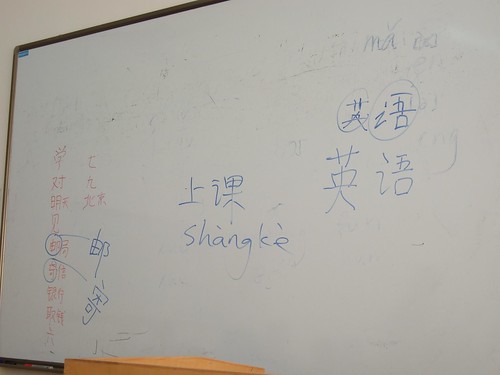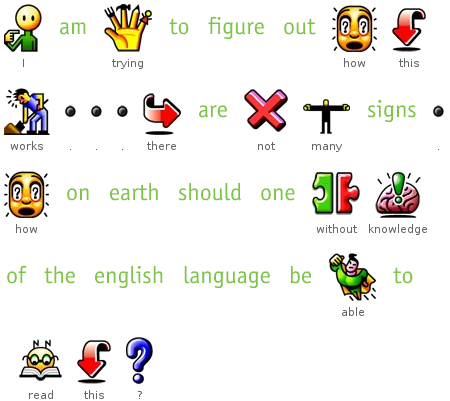Chinese | Dominik Mayer – Products, Asia, Productivity
Why Chinese Is So Damn Hard
David Moser wrote a very interesting article named Why Chinese Is So Damn Hard. Here’s the outline:
- Because the writing system is ridiculous.
- Because the language doesn’t have the common sense to use an alphabet.
- Because the writing system just ain’t very phonetic.
- Because you can’t cheat by using cognates.
- Because even looking up a word in the dictionary is complicated.
- Then there’s classical Chinese (wenyanwen).
- Because there are too many romanization methods and they all suck.
- Because tonal languages are weird.
- Because east is east and west is west, and the twain have only recently met.
I couldn’t agree more.
German Conversation Class
Two Chinese girls wanted to take me along but the teacher said he’ll only speak Chinese. They think he might have been afraid his German wasn’t as good as mine. ;-)
Chinese Friends
It’s so good to have Chinese friends. They can read the menus and bus schedules, know all the strange things in the supermarkets and find out how to tell an air conditioning to use hot instead of cold air.
That had taken me about an hour yesterday. And today I walked to university because I couldn’t find the right bus. Not the most comfortable thing with my hurting ankle.
Guided Painting

A Korean or Japanese classmate and I had to write signs on the blackboard. He did the dozen red ones on the left side, mine are the two ones in the circles on the upper right side. The ones below show how they’re supposed to look. Not that bad. But I was guided by others. They told me exactly what to paint: A horizontal line, two vertical ones, the sign for human – large –, another line and a box on top of it.
First Day of School

We only sang pinyin and my Korean classmates repeated every single Chinese syllable the teacher said. Even when it was in the middle of a sentence. I don’t know if they understood the teacher at all as their English is not the best. Too bad, we could hardly talk.
Please Sign Here
In order to take the extensive language course at the International School I had to resign at the School of Economics and Management. It’s not possible to be enrolled in both without paying extra.
Today I got my Chinese books and had to sign with my Chinese name: 马德. The first one means “horse”, the second one “kindness”, “morality” or “virtue” and is also used for German things: 德国 = Germany, 德国人 = German (person), …
I could only write the first sign so they painted both and I tried to imitate them. To make sure it’s readable they repeated “德” in brackets…
Entering the Boat
The website of Hongkou District knows:
The school name Tongji means “people are on the same boat and help each other” in Chinese.
No idea how they get that whole expression in only two signs… According to dict.cn the first one (同) means like, similar, with, together, same, alike, the second one (济) aid, ferry, frugal. Hm.
And with the boat in mind even the Tongji logo makes sense:

(Image: Wikipedia)
Sacrifices
A Chinese friend helped me practicing Chinese pronunciation via Skype and I completely forgot about the two baguettes in the oven which got some unpleasant color…
Another Icon Language
Zlango claims to be “the universal icon language”. I’m sceptical. It reminds me of all those tiny little pictures in the Chinese books trying to point out how the sign for “horse” developed from the drawing of the animal.
A real problem is the fact that they have very few icons and I have to admit that I wouldn’t understand most of them. Another analogy to Chinese…

Awaiting Chinese Books
I finally decided to get the books of the New Approaches To Learning Chinese series: Intensive Spoken Chinese, The Most Common Chinese Radicals and Rapid Literacy in Chinese. The reviews are quite promising and the method convinced me. As the books are already sent, I hope they’ll arrive tomorrow.
Chinese Textbooks
The Chinese course I attended last year used the book Chinesisch für Deutsche (Chinese for Germans). The problem is that it doesn’t contain information on how to write Chinese characters at all. You have to figure it out by yourself. And the first dialogs are about mother, father, cat, dog and the fact that some students learn while others have a break. Not the kind of vocabulary that I suppose is most needed during the first days in Shanghai.
So I think about getting a new book. ChinesePod is going to cover Integrated Chinese throughout the next semester. I also read about the New Practical Chinese Reader which is prefered by some reviewers. How on earth should I know which one is better?
